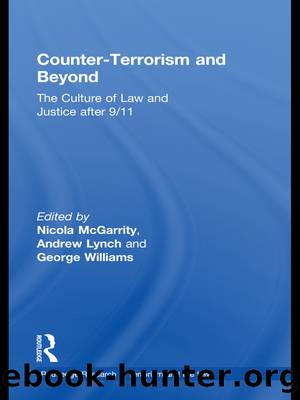Counter-Terrorism and Beyond by Lynch Andrew;McGarrity Nicola;Williams George;

Author:Lynch, Andrew;McGarrity, Nicola;Williams, George;
Language: eng
Format: epub
Tags: Law
Publisher: Taylor & Francis Group
Published: 2010-06-08T00:00:00+00:00
7.4.3 The Parkin case: testing the parameters of a fair trial
The decision of the Full Court of the Federal Court in Parkin v OâSullivan,72 which ordered the release of adverse ASIO security assessments as part of the discovery process, is ground-breaking. This case involved the deportation from Australia of US political activist, Parkin, on 17 September 2005, and the non-acceptance into Australia of two asylum seekers, Mohammed Sagar and Muhammad Faisal, who were detained in immigration detention in Nauru. The latter two men were recognised as refugees by the Department of Immigration and Citizenship in September 2005, but were refused residence in Australia after adverse ASIO security assessments were made. These three men made a joint complaint against ASIO to the Federal Court, which was heard by a single judge in 2006 (original hearing).73
The ASIO Act does not explicitly prohibit a court from ordering that adverse security assessments be discovered in the course of court proceedings. The Director-General of ASIO in 2006, Paul OâSullivan, nevertheless argued that the intention of the ASIO Act is to preclude a non-citizen, who is the subject of an adverse security assessment, from receiving a copy of the adverse security assessment, as well as the material relied on in preparing it, or from having that assessment reviewed by the AAT. This, he submitted, should be taken into account when determining whether the court should exercise its discretion to order discovery of an adverse security assessment. Justice Sundberg concluded that:
The applicantsâ claim is that they have done nothing to justify their security assessments. Therefore ASIO must be wrong to conclude that they are security threats. In order to demonstrate this to a court they need to understand why and on what basis ASIO has formed the view that it has. It stands to reason that they do not yet have the evidence to demonstrate this; that is why they have sought discovery. The Director-Generalâs argument is circular. It is, in effect, that because the applicants do not have the evidence they need, they therefore have no case and so do not need that evidence. In the circumstances of these applicants, it is not possible to say whether they do or do not have any chance of making out a good case. It would be premature at this stage to say that there is no live issue between the parties.74
Download
This site does not store any files on its server. We only index and link to content provided by other sites. Please contact the content providers to delete copyright contents if any and email us, we'll remove relevant links or contents immediately.
| Anthropology | Archaeology |
| Philosophy | Politics & Government |
| Social Sciences | Sociology |
| Women's Studies |
The Secret History by Donna Tartt(19093)
The Social Justice Warrior Handbook by Lisa De Pasquale(12191)
Thirteen Reasons Why by Jay Asher(8914)
This Is How You Lose Her by Junot Diaz(6890)
Weapons of Math Destruction by Cathy O'Neil(6281)
Zero to One by Peter Thiel(5802)
Beartown by Fredrik Backman(5759)
The Myth of the Strong Leader by Archie Brown(5510)
The Fire Next Time by James Baldwin(5450)
How Democracies Die by Steven Levitsky & Daniel Ziblatt(5219)
Promise Me, Dad by Joe Biden(5154)
Stone's Rules by Roger Stone(5088)
A Higher Loyalty: Truth, Lies, and Leadership by James Comey(4965)
100 Deadly Skills by Clint Emerson(4927)
Rise and Kill First by Ronen Bergman(4790)
Secrecy World by Jake Bernstein(4754)
The David Icke Guide to the Global Conspiracy (and how to end it) by David Icke(4720)
The Farm by Tom Rob Smith(4514)
The Doomsday Machine by Daniel Ellsberg(4491)
